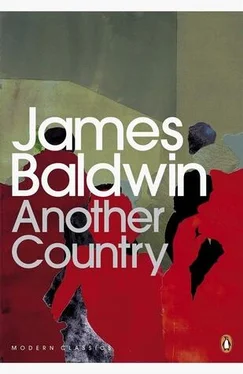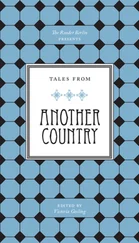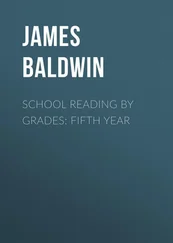“Eric!” She looked him over with the affectionate mockery he now remembered. “How nice you look with your hair so short!”
“How nice,” he returned, smiling, “you look with yours so long. Or was it always long. It’s that kind of thing a long absence makes you forget.”
“Let me look at you.” She pulled him into the apartment and closed the door. “You really look wonderful. Welcome home.” She leaned forward suddenly and kissed him on the cheek. “Is that the way they do it in Paris?”
“You have to kiss me on both cheeks,” he said, gravely.
“Oh.” She seemed slightly embarrassed but kissed him again. “Is that better?”
“Much,” he said. Then, “Where is everybody?” For the large living room was empty, and filled with the sound of the blues. It was the voice of a colored woman, the voice of Bessie Smith, and it hurled him, with violence, into the hot center of his past: It’s raining and it’s storming on the sea. I feel like somebody has shipwrecked poor me.
For a moment Cass looked as though she were sardonically echoing his question. She crossed the room and lowered the volume of the music slightly. “The children are over in the park with some friends of theirs. Richard’s in his study, working. But they should all be appearing almost any moment now.”
“Oh,” he said, “then I’m early. I’m sorry.”
“You aren’t early, you’re on time. And I’m glad. I was hoping to have a chance to talk to you alone before we go down to this jam session.”
“You’ve got a pretty agreeable jam session going on right now,” he said. Cass went over to the bar, and he threw himself down on the sofa. “It’s mighty nice and cool in here. It’s awful outside. I’d forgotten how hot New York could be.”
The large windows were open and the water stretched beyond the windows, very bright and peaceful, but murkier than the Mediterranean. The breeze that filled the room came directly from the water; seemed, almost, to bring with it the spice and stink of Europe and the murmur of Yves’ voice. Eric leaned back, held in a kind of peaceful melancholy, comforted by the beat of Bessie’s song, and looked over at Cass.
The sun surrounded her golden hair which was piled on top of her head and fell over her brow in girlish, somewhat too artless and incongruous curls. This was meant to soften a face, the principal quality of which had always been a spare, fragile boniness. There was a fine crisscross of wrinkles now around the large eyes; the sun revealed that she was wearing a little too much make-up. This, and something indefinably sorrowful in the line of her mouth and jaw, as she stood silently at the bar, looking down, made Eric feel that Cass was beginning to fade, to become brittle. Something icy had touched her.
“Do you want gin or vodka or bourbon or Scotch or beer? or tequila?” She looked up, smiling. Though the smile was genuine, it was weary. It did not contain the mischievous delight that he remembered. And there were tiny lines now around her neck, which he had never noticed before.
We’re getting old, he thought, and it damn sure didn’t take long.
“I think I’d better stick to whiskey. I get too drunk too fast on gin — and I don’t know what this evening holds.”
“Ah,” she said, “farsighted Eric! And what kind of whiskey?”
“In Paris, when we order whiskey — which, for a very long time, I didn’t dare to do — we always mean Scotch.”
“You loved Paris, didn’t you? You must have, you were gone so long. Tell me about it.”
She made two drinks and came and sat beside him. From far away, he heard the muffled cling! of a typewriter bell.
It’s a long old road, Bessie sang, but I’m going to find an end.
“It doesn’t seem so long,” he said, “now that I’m back.” He felt very shy now, for when Cass said You loved Paris he at once thought, Yves is there. “It’s a great city, Paris, a beautiful city — and — it was very good for me.”
“I see that. You seem much happier. There’s a kind of light around you.”
She said this very directly, with a rueful, conspiratorial smile: as though she knew the cause of his happiness, and rejoiced for him.
He dropped his eyes, but raised them again. “It’s just the sun,” he said, and they both laughed. Then, irrepressibly, “I was very happy there, though.”
“Well, you didn’t leave because you weren’t happy there any more?”
“No.” And when I get there, I’m going to shake hands with a friend . “A guy I know who thinks he has great psychic powers”—he sipped his whiskey, smiling—“Frenchman, persuaded me that I’d become a great star if I came home and did this play. And I just haven’t got the guts to go against the stars, to say nothing of arguing with a Frenchman. So.”
She laughed. “I didn’t know the French went in for things like that. I thought they were very logical.”
“French logic is very simple. Whatever the French do is logical because the French are doing it. That’s the really unbeatable advantage French logic has over all others.”
“I see,” she said, and laughed again. “I hope you read the play before your friend consulted the stars. Is it a good part?”
“It’s the best part,” he said, after a moment, “that I’ve ever had.”
Again, briefly, he heard the typewriter bell. Cass lit a cigarette, offered one to Eric, and lit it for him. “Are you going to settle here now, or are you planning to go back, or what?”
“I don’t,” he said, quickly, “have any plans for going back, a lot — maybe everything — depends on what happens with this play.”
She sensed his retreat, and took her tone from him. “Oh. I’d love to come and watch rehearsals. I’d run out and get coffee for you, and things like that. It would make me feel that I’d contributed to your triumph.”
“Because you’re sure it’s going to be a triumph,” he said, smiling. “Wonderful Cass. I guess it’s a habit great men’s wives get into.”
Weeping and crying, tears falling on the ground.
The atmosphere between them stiffened a little, nevertheless, with their knowledge of why he had allowed his career in New York to lapse for so long. Then he allowed himself to think of opening night, and he thought, Yves will be here. This thought exalted him and made him feel safe. He did not feel safe now, sitting here alone with Cass; he had not felt safe since stepping off the boat. His ears ached for the sound of Yves’ footfalls beside him: until he heard this rhythm, all other sounds were meaningless. Weeping and crying, tears falling on the ground . All other faces were obliterated for him by the blinding glare of Yves’ absence. He looked over at Cass, longing to tell her about Yves, but not daring, not knowing how to begin.
“Great men’s wives, indeed!” said Cass. “How I’d love to explode that literary myth.” She looked at him, gravely sipping her whiskey, without seeming to taste it. When I got to the end, I was so worried down . “You seem very sure of yourself,” she said.
“I do?” He was profoundly astonished and pleased. “I don’t feel very sure of myself.”
“I remember you before you went away. You were miserable then. We all wondered— I wondered — what would become of you. But you aren’t miserable now.”
“No,” he said, and, under her scrutiny, blushed. “I’m not miserable any more. But I still don’t know what’s going to become of me.”
“Growth,” she said, “is what will become of you. It’s what has become of you.” And she gave him again her oddly intimate, rueful smile. “It’s very nice to see, it’s very — enviable. I don’t envy many people. I haven’t found myself envying anyone for a long, long time.”
Читать дальше












